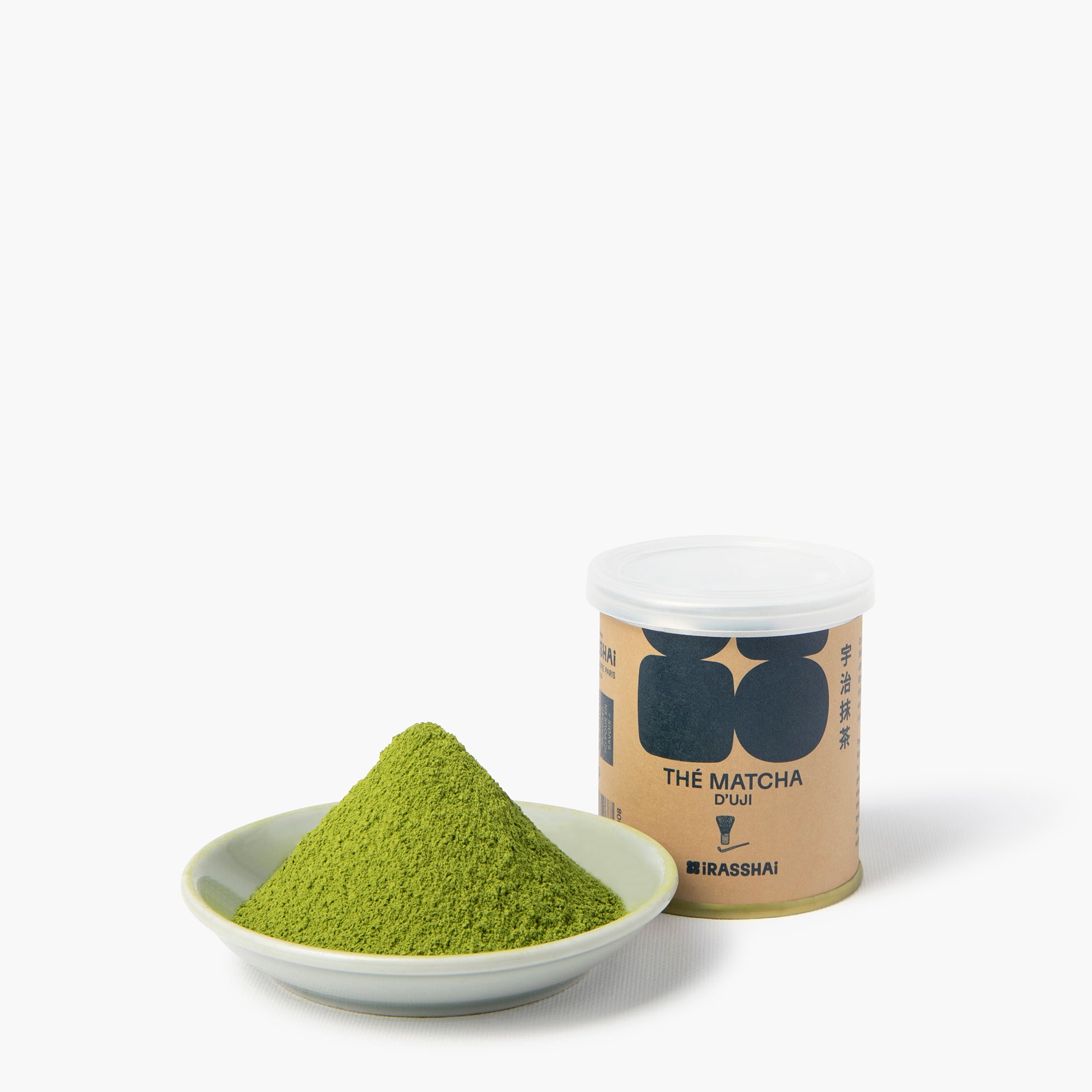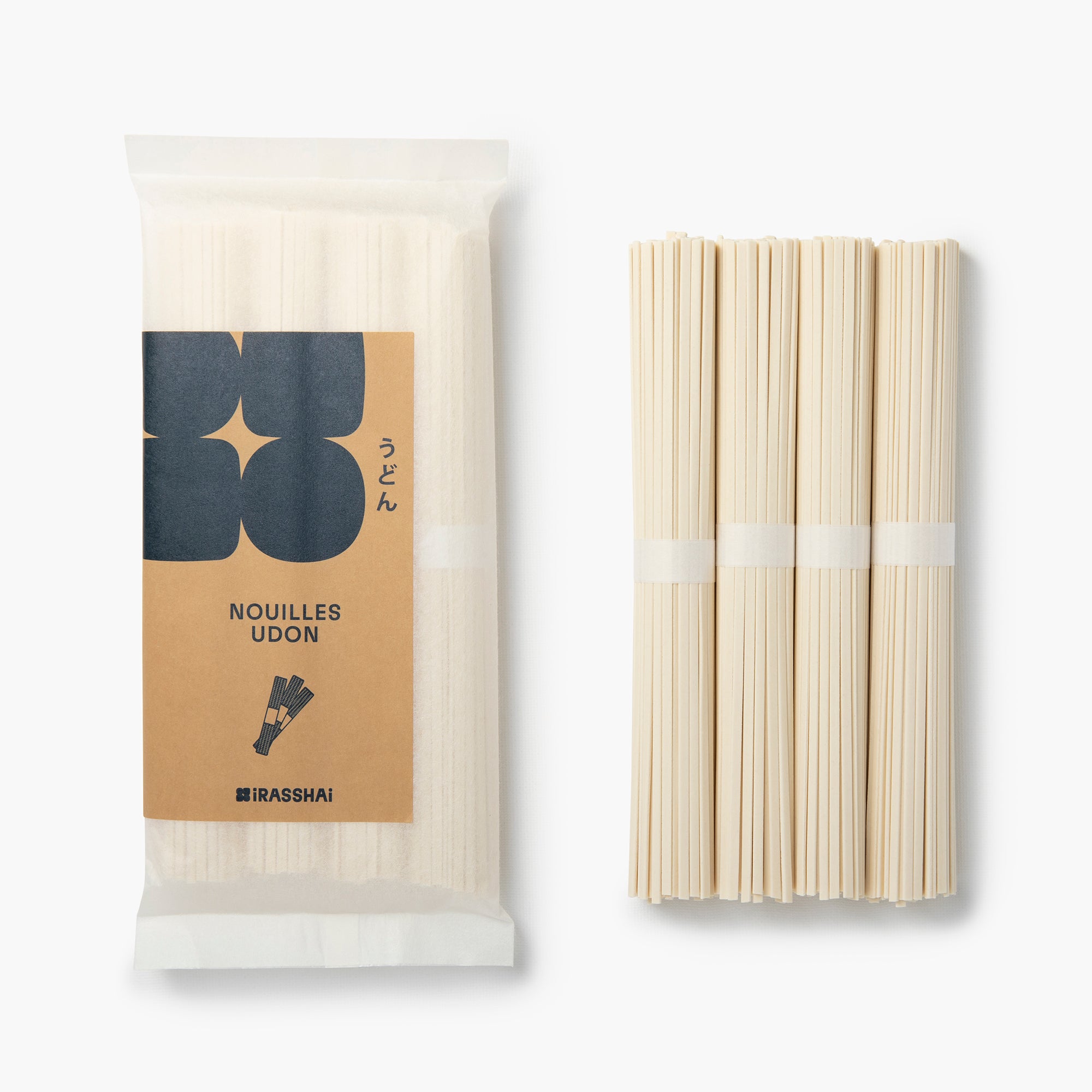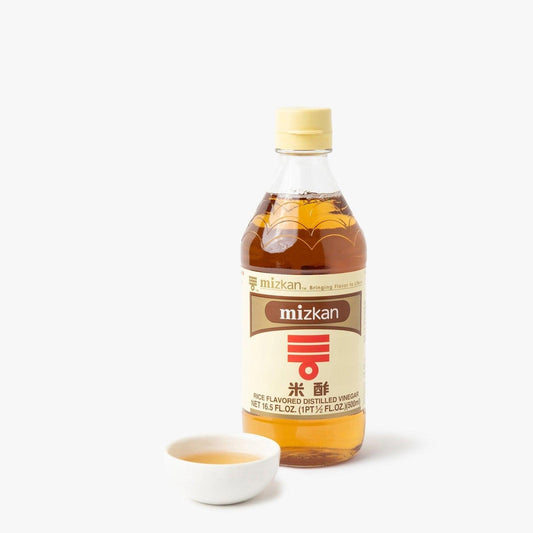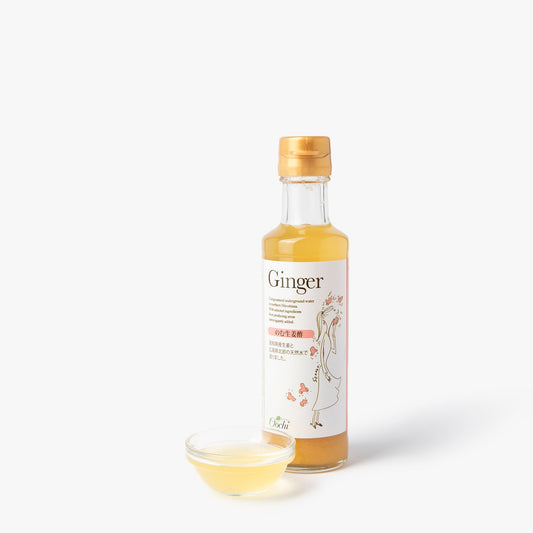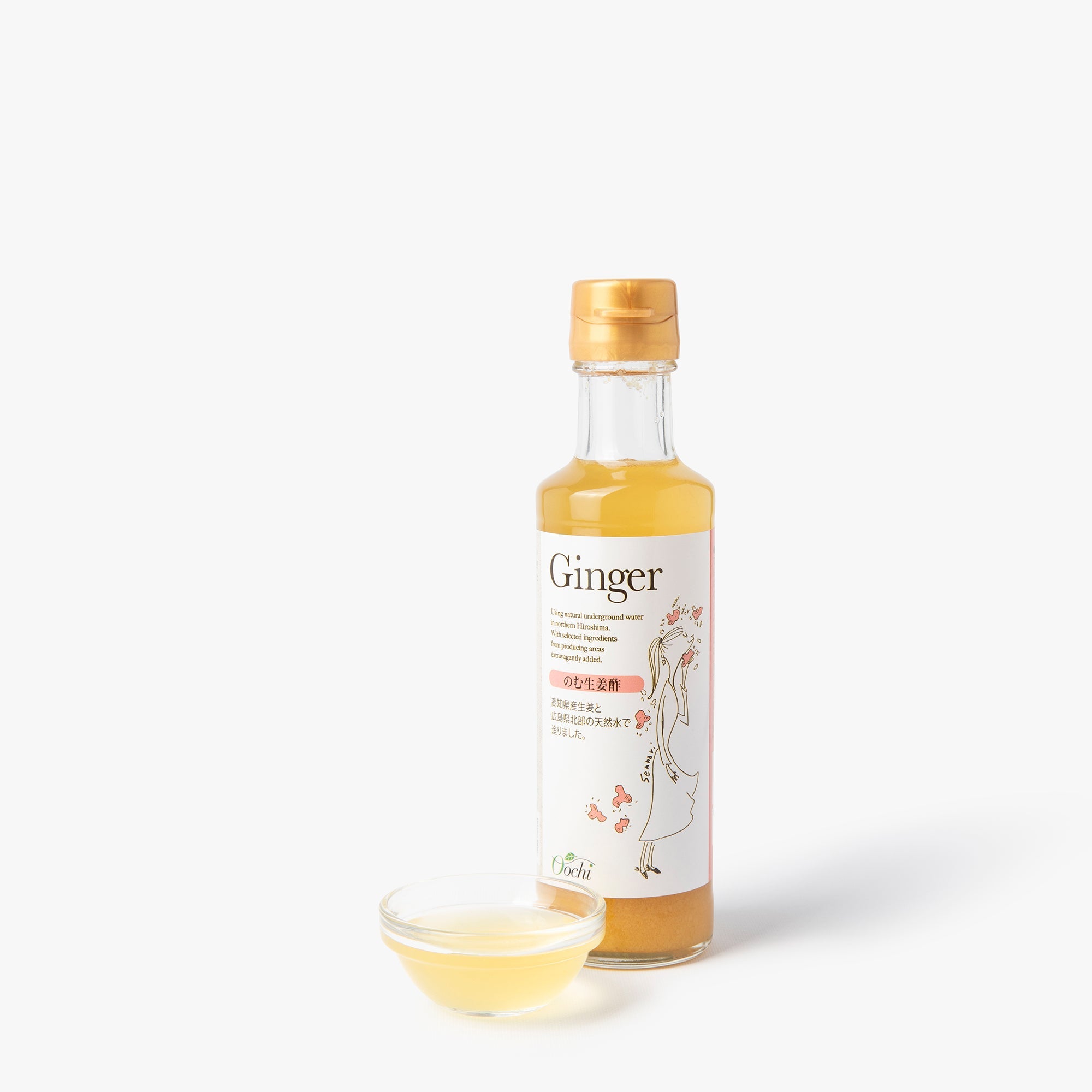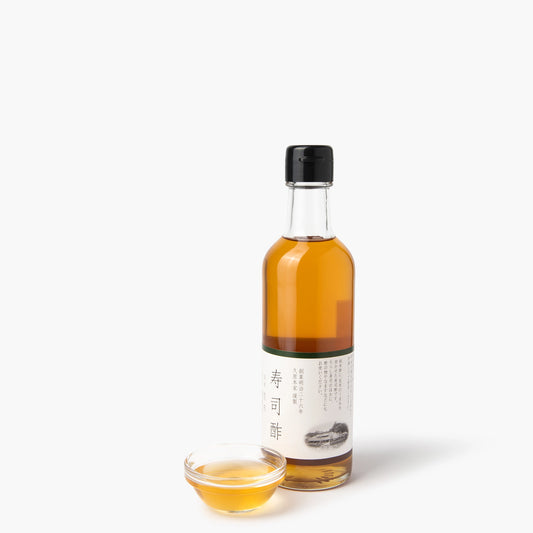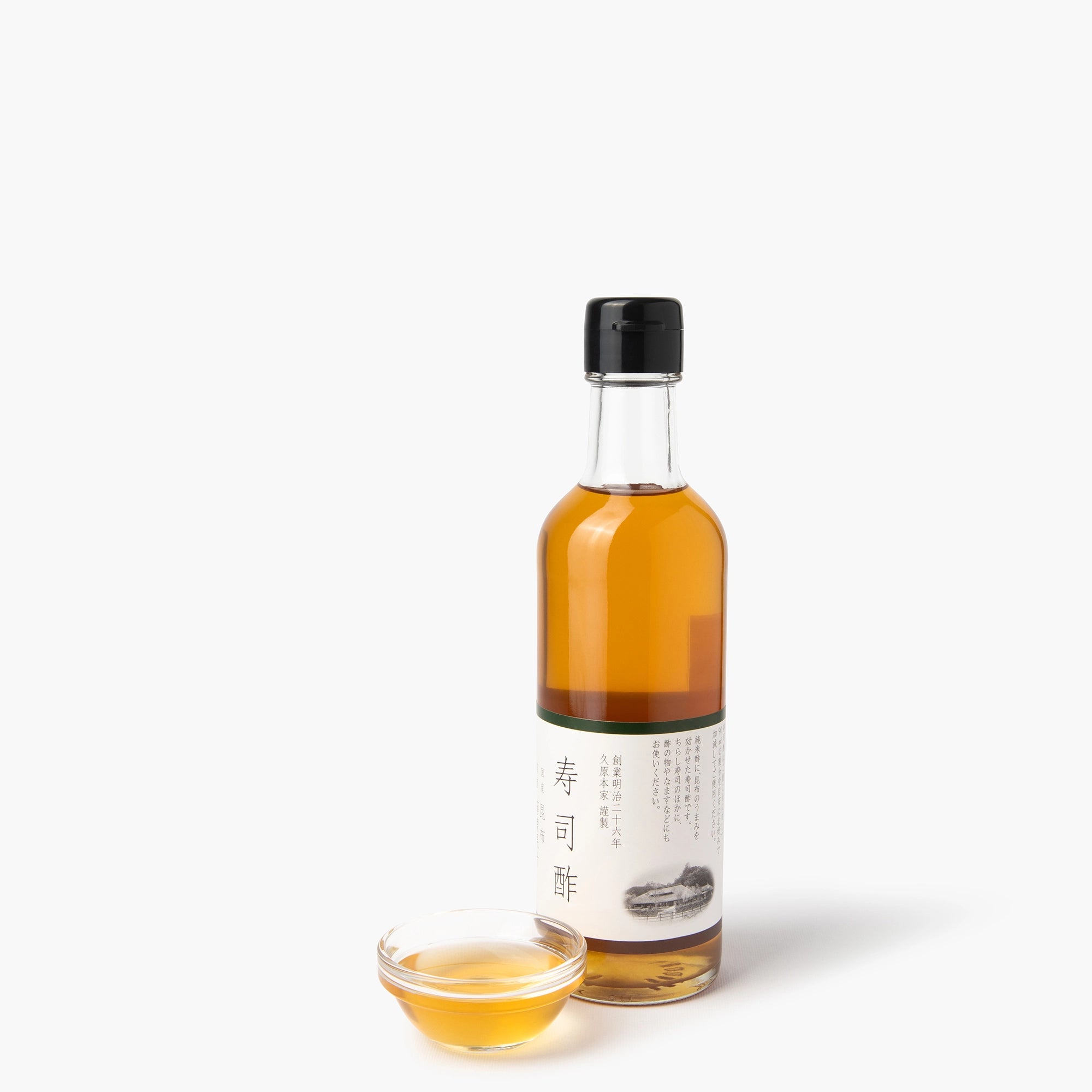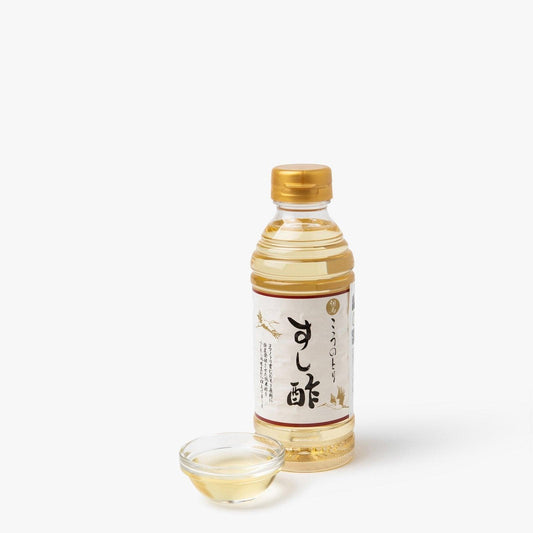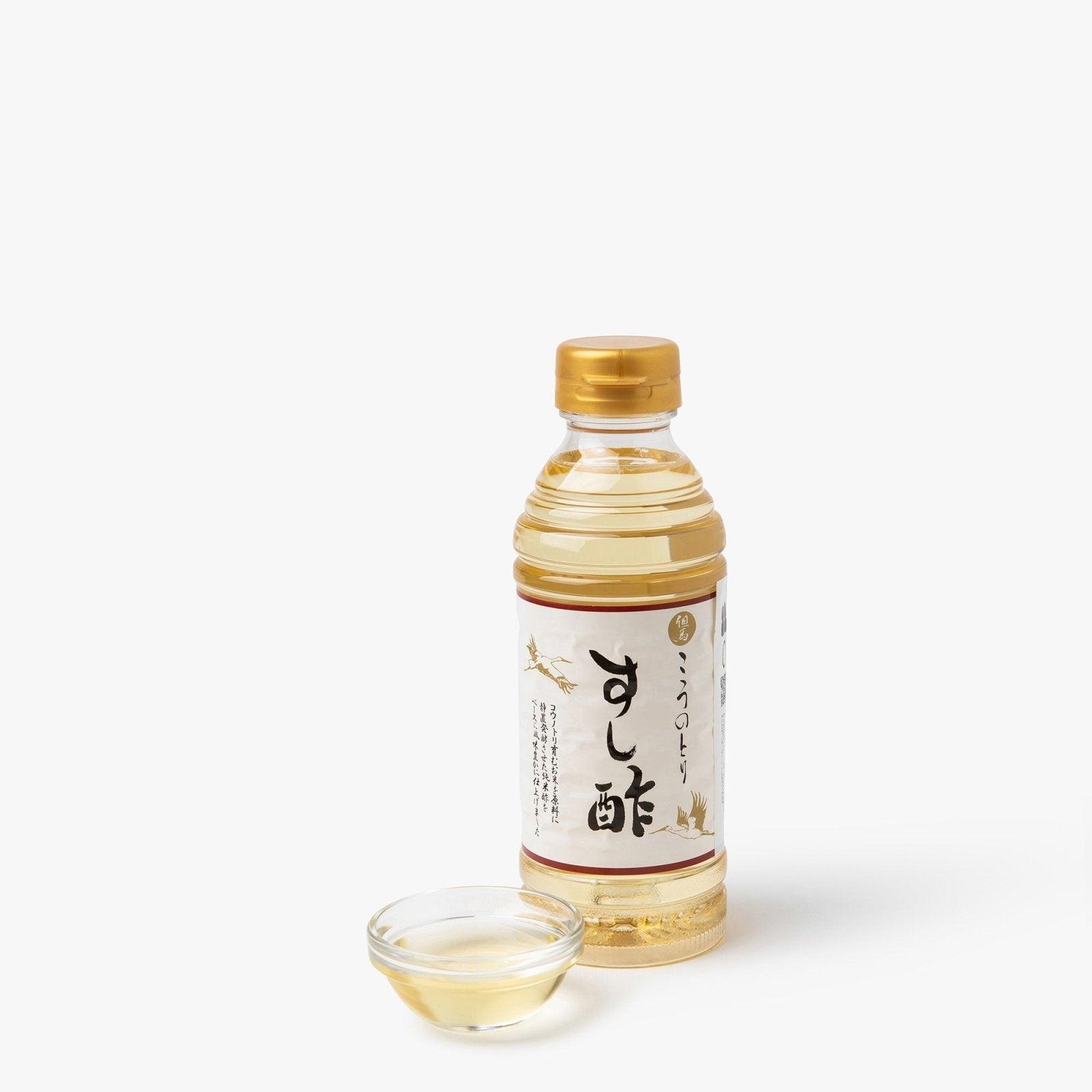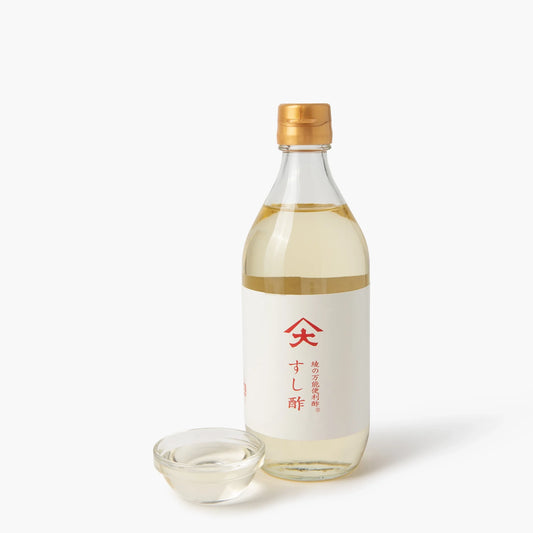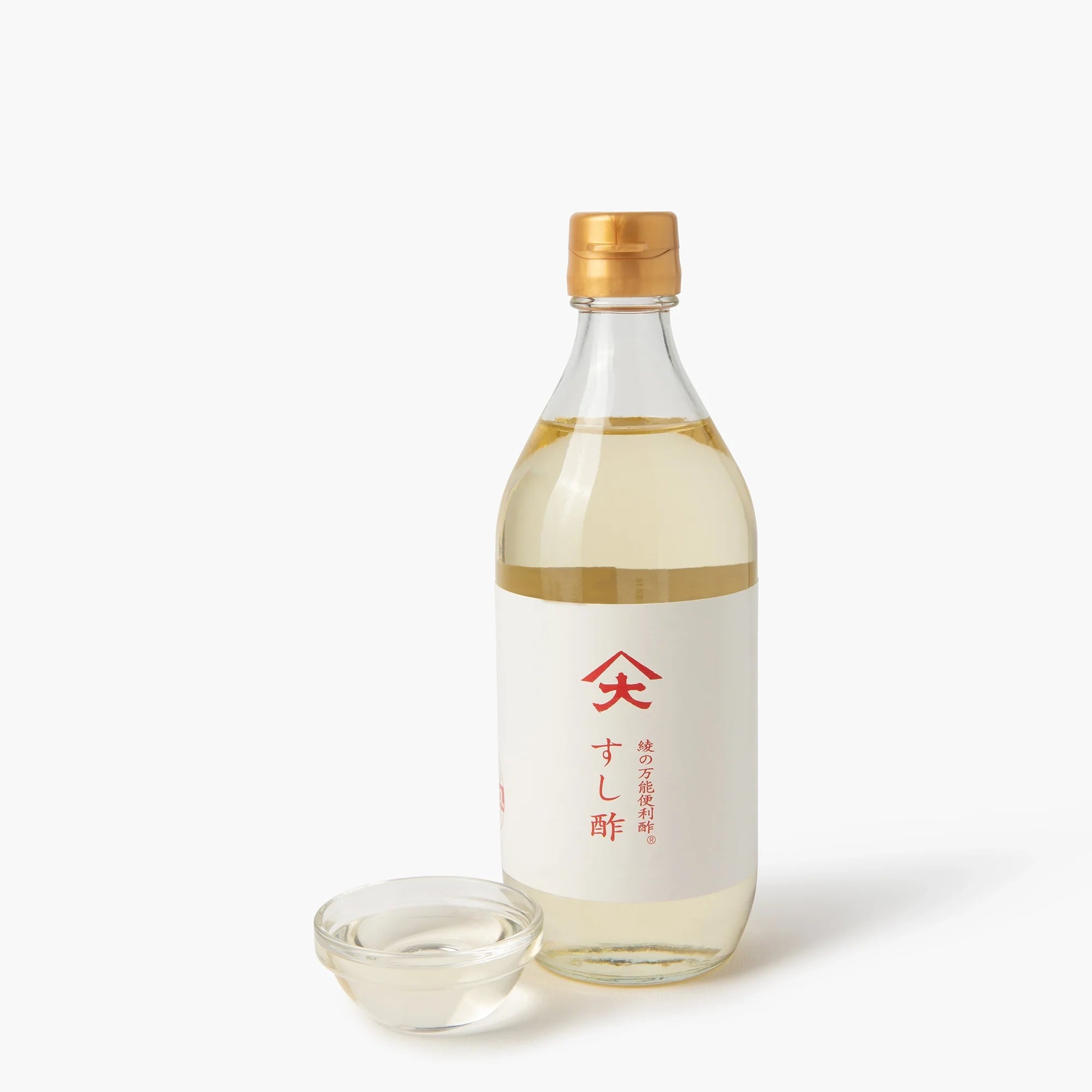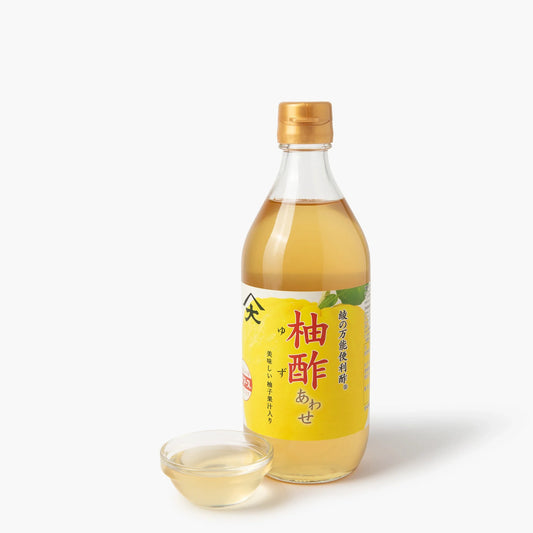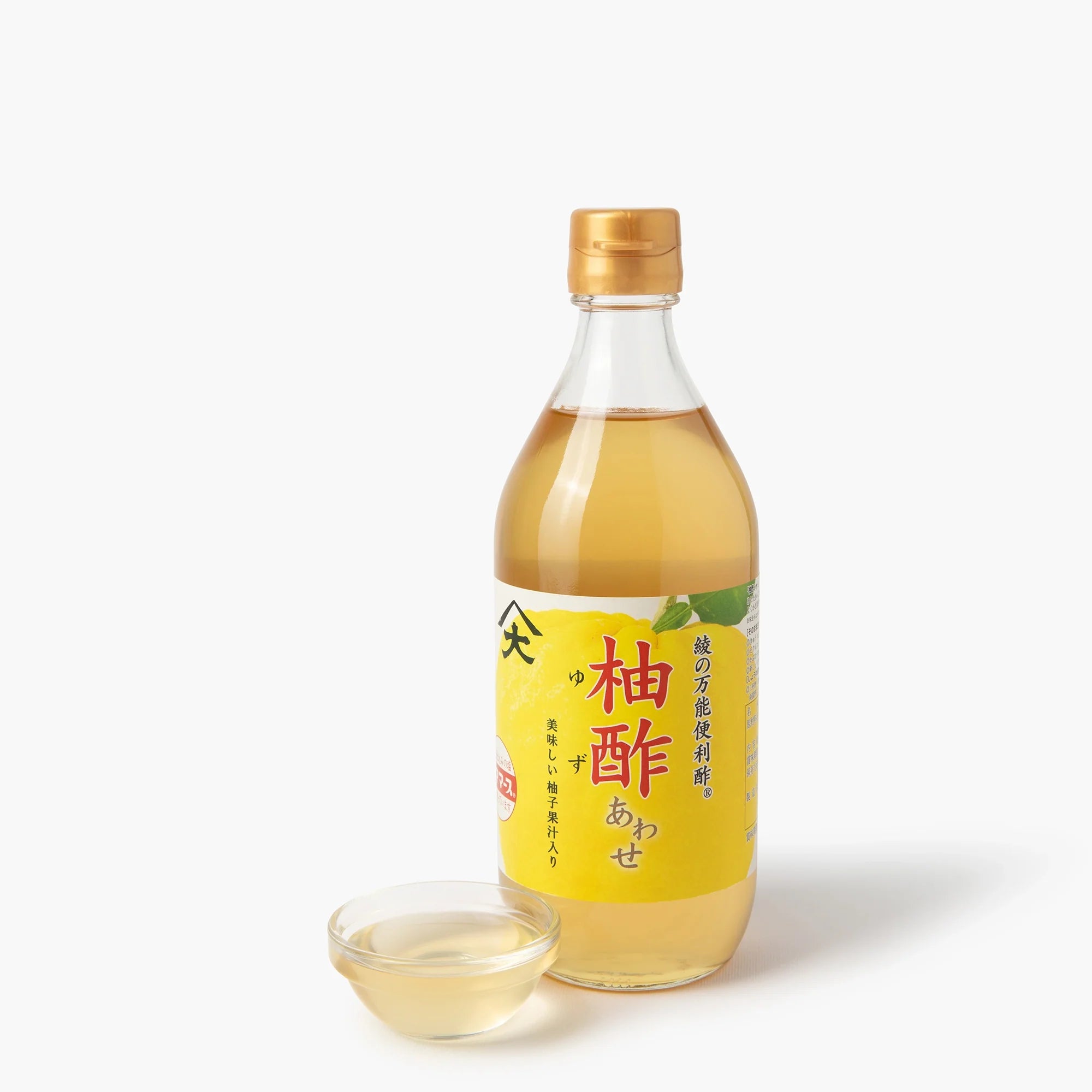Find out more about Japanese vinegar
What are the different types of Japanese vinegar?
Japanese vinegar comes in several types, each with unique characteristics suited to different uses in the kitchen. Here are the main types:
- White rice vinegar: The most common, used to season sushi and other Japanese dishes. It has a light, slightly sweet taste, perfect for marinades and vinaigrettes.
- Red rice vinegar: Fermented for longer, it has a stronger taste and a rich aroma. It is often used in more complex dishes or to add depth to sauces.
- Black rice vinegar: Used in dishes such as soy sauces or as a condiment. It has a more intense flavor and is often associated with Japanese restaurant recipes.
- Plum vinegar (Umezu): Made from Japanese plums, it's known for its strong acidity and unique taste. Perfect for marinades and seasoning acidic dishes.
- Yuzu vinegar: A citrus-flavored vinegar with a fresh, tangy taste, ideal for salads or to give an original touch to sushi.
- Junmai or sake vinegar: Produced from fermented sake, it is often used in Japanese dishes requiring a mild, balanced taste.
- Genmai (brown rice) vinegar: Richer and slightly sweeter than white rice vinegar, it is appreciated for its naturally rounder taste.
How to use Japanese vinegar in the kitchen?
Japanese vinegar is an essential seasoning in the kitchen, especially when preparing sushi and traditional Japanese dishes. Here are a few ways to use it:
- For sushi: Rice vinegar is used to season sushi rice, creating a delicately balanced flavor betweenacid and sweet, ideal for accompanying fresh fish.
- In vinaigrettes: Mix it with ingredients such as mirin, sake or ginger to prepare light, aromatic sauces for your salads or vegetables.
- Marinades: Use to marinate fish, meat or vegetables, adding soy sauces, sesame or herbs such as shiso.
- As a condiment: Vinegar can be added to dishes such as ramen or udon to enhance flavor and add a tangy note.
- With fried dishes: It's also excellent in tempura or fried dishes to bring out the flavors.
What is the origin of Japanese vinegar and why is it so popular in Japan?
Theorigins of Japanese vinegar go back many centuries, with evidence of its use in Japanese cuisine as early as the 7th century. At that time, vinegar was mainly used to preserve foodstuffs, particularly fish, and for its antiseptic properties. It gradually evolved into an essential seasoning in many Japanese dishes.
Rice vinegar, one of the most popular types, was perfected in Japan through the fermentation of rice and the influence of sake culture. Over time, Japanese vinegar has gained a reputation for its quality, smoothness and ability to balance flavors in cooking, particularly sushi.
Its popularity in Japan is therefore due to its historical role, its health benefits and its ability to enhance the taste of dishes while respecting the principles of balanced, refined Japanese cuisine.
Can Japanese rice vinegar be used as a vinegar substitute in Western recipes?
Yes, Japanese rice vinegar can perfectly well be used as a substitute for vinegar in Western recipes, but you have to take into account its particularities. Rice vinegar has a milder, less acidic and slightly sweeter taste than European vinegars such as white vinegar, cider vinegar or balsamic vinegar. Here are a few points to consider:
- For dressings and sauces: Rice vinegar goes well with ingredients such as soy, sesame and honey. It can be used to season salads, offering a milder, more subtle taste.
- In marinades: Its mild, light taste makes it an excellent choice for marinating vegetables, chicken or even fish, replacing the more acidic vinegars of Western recipes.
- In sauces for hot dishes: It can be incorporated into sauces for meat or fish dishes, adding a touch of freshness without overpowering the other flavors.
- In pasta or rice recipes: If you want to add a subtle, less acidic note to dishes such as stir-fries or rice, rice vinegar is a good option.
However, because of its less acidic taste, you may need to adjust the quantities or add a little salt or sugar to achieve the desired balance. Japanese rice vinegar, especially in its organic or junmai version, can therefore be an excellent alternative for bringing a Japanese flavor while respecting Western cooking principles.
What dishes can be prepared with yuzu vinegar?
Yuzu vinegar is an aromatic and flavorful ingredient, ideal for adding a fresh, tangy touch to many Japanese dishes and other recipes. Here are a few ideas for dishes where yuzu vinegar can be used:
- Sushi and sashimi: Yuzu vinegar can be used to season sushi rice, offering a fruitier, citrusier flavor than traditional rice vinegar. It goes well with raw fish, especially salmon or tuna.
- Japanese salads: Use it in salad dressings to add a tangy, fragrant note to fresh vegetables, such as in wakame salad or cucumber salad. Yuzu vinegar also goes very well with seaweeds pickled radishes.
- Grilled or fried fish dishes: Yuzu vinegar can be incorporated into sauces to accompany grilled fish or tempura. Mix with soy and mirin for a light, flavorful sauce.
- Soups and broths: It can be added to soups like miso soup or broths to add a touch of freshness and complexity to the taste. Perfect for balancing the umami of miso or the richness of broths.
- Meat dishes: Yuzu vinegar can be used in marinades for grilled meats such as chicken or beef. It adds a touch of freshness and acidity that goes well with grilled flavors.
- Sauces and condiments: You can also create dip sauces or condiments to accompany dishes like gyoza (Japanese ravioli) or tempura by mixing yuzu vinegar with sesame, soy or honey.
- Desserts: Yuzu vinegar can also be used to create sorbets or ice creams. Its citrus touch goes well with fruits such as raspberries, blackberries or mango.
What are the health benefits of vinegar?
Japanese vinegar, such as rice vinegar, yuzu vinegar or plum vinegar, offers several health benefits, due to its antibacterial, digestive and metabolism-boosting properties. Here are just a few of the benefits:
- Improved digestion: Vinegar, particularly rice vinegar, contains organic acids that help stimulate the production of digestive juices and facilitate the digestion of proteins and fats. It can therefore be beneficial for mild digestive disorders.
- Antibacterial properties: Plum vinegar and rice vinegar have antimicrobial properties that can help reduce the growth of certain bacteria, offering protection against gastrointestinal infections.
- Metabolism regulation: Some studies suggest that moderate consumption of vinegar, particularly organic rice or yuzu vinegar, can help regulate blood sugar levels, contributing to a more stable metabolism and weight management.
- Blood pressure reduction: Research has shown that the acetic acid contained in vinegar can have a positive effect on reducing blood pressure, by relaxing blood vessels and reducing tension.
- Antioxidants: Yuzu vinegar, rich in vitamin C, is an excellent antioxidant that helps fight free radicals in the body, reducing the risk of chronic disease and promoting healthy skin.
- Acid-base balance: Although vinegar is acidic, it helps maintain acid-base balance in the body, especially when used in moderation, supporting good bone health and reducing inflammation.
- Immune system boost : Plum vinegar and sake vinegar contain fermentation properties that boost the immune system, thanks to the production of bacteria beneficial to the intestine.
Why do Japanese people drink vinegar before meals?
Yes, in Japan it's common to consume vinegar before or during a meal, particularly in the form of drinks called "osu no mono" (お酢のもの) or "su drink" (酢ドリンク).
Vinegar consumption is deeply rooted in Japanese culture for several reasons:
- Digestive benefits: Vinegar is believed to stimulate digestion and aid nutrient absorption.
- Regulation of blood sugar levels: It is sometimes consumed before a meal to limit blood sugar peaks.
- Refreshing and invigorating effect: Some vinegar beverages are popular in summer to combat fatigue and heat.
- Metabolism support: Some believe vinegar helps burn fat and control weight.
Vinegar-based drinks are readily available in konbinis (Japanese mini-markets) and supermarkets, often mixed with other ingredients to sweeten the taste:
- Apple vinegar (りんご酢 - ringo-su): The most common, with a sweet, fruity taste.
- Plum vinegar (梅酢 - umesu): Appreciated for its slightly salty, tangy taste.
- Black vinegar (黒酢 - kurozu): Made from fermented rice, it's sweeter and richer in umami.
- Yuzu or lemon vinegar: Very refreshing and popular in summer.
These drinks are often diluted with water, sparkling water or even milk to reduce their acidity. Some are lightly sweetened or mixed with honey.
When and how to use drinking vinegar?
- Before a meal: Pure or diluted to aid digestion.
- Alcohol-free aperitif: An alternative to soda or beer.
- In cocktails: Mix with shochu or sake.
- After a bath or onsen: To replenish lost minerals.
Try apple vinegar diluted in sparkling water with a little honey. It's a gentle, affordable version!
Why is vinegar used in sushi rice?
Rice vinegar is used in sushi rice to give it its characteristic mild, tangy and slightly sweet flavor. This preparation, known as sumeshi (or shari), balances the taste of the raw fish and toppings, while giving the grains a light sheen and better hold. Traditionally, the mixture includes rice vinegar, sugar and salt. This vinegar also plays a role in preserving sushi, a function inherited from its ancient origins. It's an essential ingredient for the success of real sushi rice, whether rolled, pressed or in a ball.



